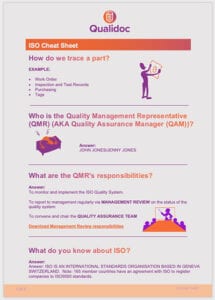I am always surprised at the attention and time paid to produce “mission statements”. My view has always been that my clients are entitled to the very best I can do because they are paying me and have put a considerable amount of trust in the outcome of my service; it’s as basic as that.
I would be pleased to hear from anyone who has bought an item or service based on a mission statement. I am convinced that customers are not interested in promises or elaborate statements of goodwill. They want to know if you can provide what they want, when they want it and at a price that doesn’t frighten them to death.
Having said that, I have found the quality policy outlined below, which I have used as part of my quality policy manual for many years, has always been well accepted by assessors, and (after careful scrutiny and agreement as to the content), by my clients.
The assessors can check this statement of commitment easily against the rest of the policy manual and the quality assurance procedures that support the policies. It should also prevent senior executives from producing flamboyant statements about the business which have no basis in reality.
I have tried to keep the statements within a practical business environment to give CEOs and other senior executives a starting point in recognising where these statements relate to their business. The opening statement obliges them to really think about what the business is all about and how they would want it described on the accreditation certificate.
For example, careful attention should be paid to whether or not design is included in the business scope. If no designs are developed or purchased for inclusion in the product (including those provided by suppliers) then an exemption can be claimed for that part of the standard. If you are not sure then it pays to discuss the scope of your business with the assessor of choice before completing the application. The time and attention you pay to this will be well worthwhile.
QUALITY POLICY MANUAL
MANAGEMENT RESPONSIBILITY AND AUTHORITY
Quality Policy
1 I.M. Happy Company (hereafter referred to as IMH) is in the business of designing and producing (insert concise and precise description of your company’s product or service).
2 IMH management believes that the responsibility for supplying consistently reliable products and service requires the full commitment of every IMH employee. To achieve and maintain this commitment, employees are trained in quality assurance policies and procedures and in programmes such as Health and Safety in the workplace, Drugs and Alcohol Abuse, and Environmental awareness.
3. IMH quality assurance is established by formal written procedures, working instructions and sufficient inspection throughout all phases of production and service carried out by IMH staff. The IMH commitment to the quality system is expressed in the company Quality System Manuals and associated documents (hard copy and on-line), which comply with the ISO9001:2008 standard.
4. The IMH quality objectives are reviewed regularly by senior management. Commitment to the quality programme begins with a review of customer requirements and continues through all aspects of product development and customer support. Every effort is made to ensure prompt detection of, and response to, deficiencies in production and customer service.
5 Levels of customer satisfaction are monitored regularly to ensure that current and future requirements and preferences are met. This commitment to quality and continuous improvement extends to suppliers, who are involved closely in IMH quality assurance requirements.
6 Quality planning includes activities and resources needed to achieve quality objectives, such as verification activities and personnel, criteria for acceptability and quality records required to maintain customer confidence.
________________________
CHIEF EXECUTIVE OFFICER
This policy statement shows that at least you are aware of the commitment involved in developing and maintaining a quality system, which is what the assessor wants to see and confirm during the certification audit.
If you assume, however, that you need not choose your words with care when describing your business, consider the words of a well-known writer from an earlier age.
“Neither can his mind be thought to be in tune, whose words do jarre; Nor his reason in frame, whose sentence is preposterous” —Ben Jonson.
(Benjamin Jonson, c. 11 June 1572 – 6 A
